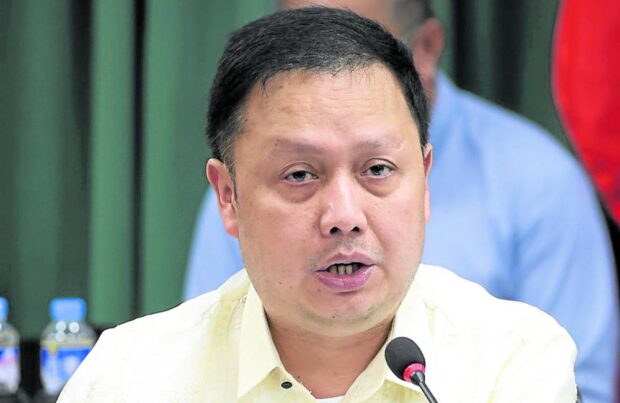‘Small committee’ to decide cuts in VP’s secret funds

Ako Bicol party-list Rep. Elizaldy Co (Photo from his Facebook page)
The fate of the confidential funds of the Office of the Vice President (OVP) and the Department of Education (DepEd) is now in the hands of a “small committee” formed by the House of Representatives before it passed the 2024 national budget bill on Wednesday night.
Its members are Ako Bicol Rep. Elizaldy Co, chair of the House appropriations committee; Marikina City Rep. Stella Luz Quimbo, the committee’s senior vice chair; House Majority Leader and Zamboanga City Rep. Manuel Jose Dalipe; and House Minority Leader Marcelino Libanan of 4PS party list.
On Wednesday, Co announced the chamber’s plan to transfer part of the P650-million confidential funds requested by the two offices under Vice President and Education Secretary Sara Duterte to agencies with surveillance or intelligence-gathering activities related to securing the West Philippine Sea.
He said a consensus emerged among House leaders to reallocate the secret funds to the National Intelligence Coordinating Agency, National Security Council, Bureau of Fisheries and Aquatic Resources, and Philippine Coast Guard (PCG).
The objective was “to boost the country’s monitoring and operational capabilities in protecting our territorial waters and securing the rights and access of Filipino fishermen to their traditional fishing grounds,” Co said.
Article continues after this advertisementIn a statement, Speaker Martin Romualdez said the decision to reallocate confidential and intelligence funds was made after “the House was able to assess and evaluate the nature and use of these funds and correct any mix-ups and allay public concerns regarding this issue.”
Article continues after this advertisementBut it still wasn’t clear how much would be taken from Duterte’s offices.
The OVP had sought P500 million and DepEd P150 million in confidential funds for 2024, the same amounts they received this year.
It was also recently revealed that the OVP requested P250 million in confidential funds last year and was granted half of it, after Duterte took over from her predecessor Leni Robredo, who didn’t receive any secret allocations throughout her six-year term.
The small committee was created as the House approved House Bill No. 8980 or the 2024 General Appropriations Bill (GAB).
During the plenary session, the House leadership announced that all individual amendments must be submitted to the small committee not later than Friday.
House tradition
It is through the small committee that the House entertains individual amendments to the GAB even after it has technically been approved. This practice used to be controversial for skirting plenary rules but it has become a tradition in the chamber.
On Thursday, ACT Teachers Rep. France Castro said all of the confidential funds earmarked for the OVP and DepEd should be realigned.
“There should be nothing left of the [confidential funds] not only of the OVP and the DepEd, but all other civilian agencies that are not mandated to conduct surveillance or gather intelligence,” Castro told the Inquirer in a text message.
Gabriela Rep. Arlene Brosas said there was no basis at all for the OVP and DepEd to have confidential funds in the first place. She also called for the deletion of all confidential funds and a “drastic reduction” of intelligence funds.
Former lawmaker and Bayan Muna chair Neri Colmenares shared the sentiment, saying the appropriations should be reallocated to the PCG and other agencies as public and regularly audited funds.
“No CIF (confidential and intelligence funds), period. Public funds should be regularly audited,” he said.
Confidential funds are intended for surveillance-related activities while intelligence funds are for collecting information related to national security. But the use of these funds is believed to be prone to corruption because they are not subject to publicly disclosed state auditing protocols.
Also on Thursday. Albay Rep. Edcel Lagman defended the chamber’s decision to move funds to other agencies, saying this was not prohibited under the 1987 Constitution.
He was responding to retired Supreme Court Associate Justice Adolfo Azcuna’s post that the realignment of confidential funds from the OVP to fund agencies protecting the West Philippine Sea would violate the Constitution.
In a Facebook post, Azcuna argued that Congress “may not INCREASE” appropriations as recommended by the President, citing Article VI Section 25 of the Constitution.
But Lagman, a lawyer himself, said Azcuna’s argument was “not correct,” as realignment was “within the totality of the expenditure program proposed by the President.”
3 votes against
On Wednesday night, the GAB was passed at 9:48 p.m. by a 296-3 vote, with the only negative votes coming from the Makabayan bloc.
Once the Senate passes its own version, the two chambers will meet in conference to reconcile differences between the two bills. The result will be transmitted to the Office of the President for signing, and will be called the General Appropriations Act of 2024.
Toward the end of the session, Kabataan Rep. Raoul Manuel questioned the House’s decision to approve the GAB on second and third reading in one night.
He argued that under the Constitution, any certification of urgency from Malacañang allowing the immediate enactment of a law should only be in the event of a public calamity or emergency.
But his microphone was turned off as he was raising his point of order.
“Tyranny has prevailed in this House. I vote no and I will explain my vote. My microphone was even switched off, and this is an affront to the people,” Manuel said.